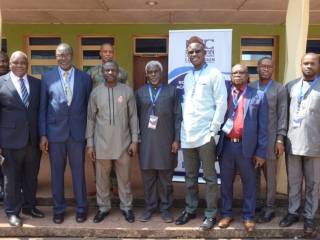The forum is expected to improve collaboration among the Commission, academia, telecom industry players and other stakeholders to accelerate innovation, industrial growth and sustainable development in the Nigerian telecoms industry.
Present at the event were members of the academia from various universities and Polytechnics in the Southeast region of the country, representatives of telecom companies and other regulatory bodies.
Speaking at the event, the Executive Vice Chairman of NCC, Prof Umar Garba Danbatta, represented by Engr. Austine Nwaulune , Director Spectrum Administration , NCC, stated that regulatory excellence has the capacity to drive social and economic transformation in the country and, the NCC seeks to ensure regulations are matched with existing realities.
The EVC further acknowledged that the innovations, inventions and improvements that evolve from collaboration with academia are a catalyst for improved efficiencies and productivity, economic growth and will attract more FDI into the country, and with that in mind, NCC as a regulator of a critical sector, aims to ensure all stakeholders are protected and the industry is nurtured for maximum benefits to all players in the industry.
The NCC boss stated that “the emergence of new technologies such as Artificial Intelligence (AI), Internet of Things (IoT), Smart cities, 5th generation network (5g), Broadband technology has led to huge opportunities and consequent risks, hence, the need for collaboration between academia, industry and regulators to ensure that these technologies are adequately prepared for by the time they emerge in the Nigeria’s telecom ecosystem”.
“The potential opportunities and important aspects that should be considered by all stakeholders are critical aspects that academia are invited to research and proffer pragmatic solutions”.
Prof Danbatta reiterated that the three areas which are fundamental to future growth and development of the sector include: innovation in terms of new ideas, industry growth in terms of building capabilities and the role of the regulator in promoting synergy between the academia and the NCC while ensuring regulatory excellence and operational efficiency of the industry.
“The Commission has, among other things, directed funds to encourage innovation by boosting research and development in Universities across the country; there is need to collaborate with emphasis on development of prototypes that would meet the standards required by the industry”, he said.

